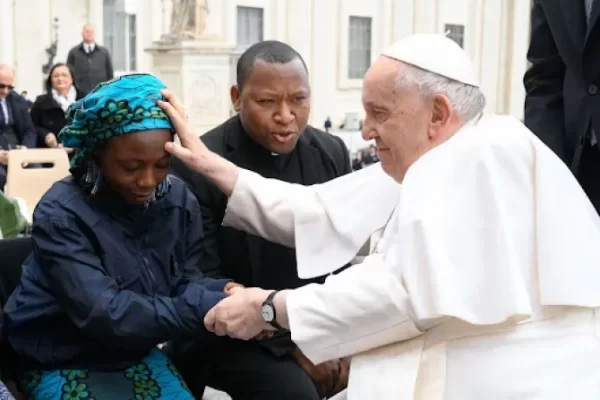Two young Nigerian girls suffered horrendous violence at the hands of the Boko Haram terrorist group, met Pope Francis on 8 March.
Sixteen-year-old Maryamu Joseph, who escaped from Boko Haram in July after being held against her will for nine years, greeted the pope with Janada Marcus, also a victim of Boko Haram kidnapping, at the end of his general audience on 8 March.
Both girls saw members of their families murdered by Boko Haram. Marcus’ father was beheaded by a machete in front of her in 2018. Joseph saw her brother killed and cut into pieces in 2019.
“Right before my eyes, they took one of my siblings and killed him. They cut off his head, then his hands, legs, and stomach,” she said in a report published by Aid to the Church in Need (ACN).
The pontifical charity arranged for the girls to meet the pope on International Women’s Day. Pope Francis recently wrote a book preface in which he condemned violence against women.
“We must find the cure to heal this plague and not leave women alone,” the Pope said.
After escaping the Boko Haram, Joseph and Marcus both received treatment at the Trauma Center of Maiduguri in northeastern Nigeria, a center built with the assistance of ACN.
Their stories are detailed in the report “Nigeria: A Bleeding Wound,” which shares firsthand testimonies of Catholics who have survived torture, kidnappings, and massacres at the hands of Nigerian terrorists.
“Nine years of living in bondage! Nine years of torture! Nine years of agony! We suffered so much at the hands of these heartless, ruthless people. For nine years we saw the shedding of the innocent blood of my fellow Christians, killed by people who do not value life. They murdered without remorse, like it’s a normal thing to do,” Joseph said of her time in captivity.
At the age of 7, she was abducted along with 21 others when the Boko Haram attacked her village.
“They put the Christians in cages, like animals. The first thing they did was forcefully convert us to Islam. They changed my name to Aisha, a Muslim name, and warned us not to pray as Christians or we would be killed,” Joseph said.
Marcus, 22, was forced to flee Boko Haram with her family twice before the terrorists attacked them again in the city of Maiduguri. In this attack, Marcus’ father was told to either rape her or be killed.
“With a machete pointed at my father’s forehead, he looked at my mother and at me, but I avoided eye contact because I was ashamed to look him in the face, ashamed of what the men had suggested — it was an abomination!” Marcus told ACN. “My father put his head down in submission to be killed and answered: ‘I cannot sleep with my own flesh and blood, my own daughter, I would rather die than commit this abomination.’”
Her father was beheaded, and Marcus continued to suffer at the hands of the Islamic terrorists.
“They took me to the bush and tortured me severely, emotionally, physically, and mentally for six days. I suffered a lot of terrible and wicked experiences — beyond explanation — that made those six days seem like six years,” Marcus said.
Violent persecution in Nigeria has become a growing concern in recent years, according to many religious freedom organizations, including ACN.
Both priests and lay faithful are regularly targeted by Islamic terror groups such as Boko Haram, the Islamic State West Africa Province (ISWAP), and militant Fulani.
In the face of this persecution, Nigeria has the highest Mass attendance of any country in the world. According to recent data compiled by the Center for Applied Research in the Apostolate, 94% of Catholics in Nigeria attend Mass at least weekly.
Marcus shared that the six months that she spent at the trauma center were months of “healing, prayers, and counseling.”
“After my healing process, I enrolled in college. I am very happy, and I will give it my all to finish my degree and become someone great in society. … I acquired new skills that have made me so proud of myself,” she said.
“Emotionally, I have learned to let go of my past; I have learned the art of healing by letting go of my pain. My faith has strengthened.”
“It’s hard to forgive and forget, and with all that I have gone through at the hands of Boko Haram I can’t even believe that I am the one saying this, but I have forgiven them in my heart, and I pray for the redemption of their souls,” Marcus said.



